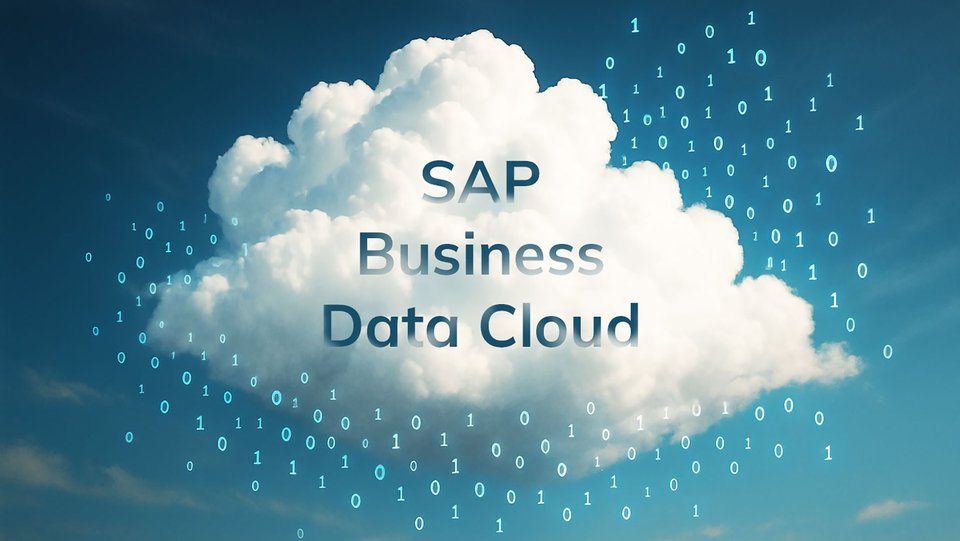SAP Datasphere: Foundation for data integration and modeling
SAP Business Data Cloud: The new era of data integration and AI-powered analytics
With the introduction of the SAP Business Data Cloud (BDC), SAP is driving forward the evolution of its Data & Analytics platform. The BDC seamlessly connects various data sources and offers an integrated, scalable architecture for data management. The focus is now primarily on AI and the integration of Databricks directly into the BDC solution.
Data forms the basis of all modern companies. It is the cornerstone of digital transformation and the driving force behind artificial intelligence (AI). Through the strategic partnership with Databricks, SAP is creating a platform that not only simplifies the integration of SAP and non-SAP data, but also provides advanced analytics and AI capabilities.

What is the SAP Business Data Cloud?
The SAP Business Data Cloud is a fully managed SaaS solution that unifies and manages all SAP data and seamlessly connects it with data from third-party providers. At its core, it combines the strengths of SAP Datasphere, SAP Analytics Cloud and the connection to SAP BW with the new SAP Databricks component. This integration creates a comprehensive ecosystem that breaks down data silos and enables a holistic view of company data.
The architecture is based on a cloud-native infrastructure and comprises four key components:
SAP Analytics Cloud: Analysis and visualization functions
SAP BW connection: Integration with existing SAP BW environments
SAP Databricks: Data processing, AI and machine learning functions
The platform is aimed at different user groups: Data analysts and data scientists benefit from advanced analysis functions, business users can access data in a user-friendly way, IT teams receive a standardized governance platform and managers gain contextual insights for well-founded decisions.
The partnership with Databricks: a game changer
The strategic partnership between SAP and Databricks marks a turning point in the data landscape. It combines the most important business data for companies (SAP data) with one of the leading data platforms on the market (Databricks).
SAP Databricks is a native component of the SAP Business Data Cloud, available on Azure, AWS and Google Cloud Platform. This integration enables:
Seamless integration of SAP data with other company data
Bidirectional data exchange between SAP Databricks and the corporate environment
Preserving the semantic meaning and context of SAP data
Use of AI, data warehousing and data engineering functions
A key technology of this partnership is Delta Sharing - an open source protocol that enables data exchange between different platforms without physically moving the data. This offers decisive advantages for SAP BW integration and cross-workspace data exchange.
Core functions and benefits of the SAP Business Data Cloud
Seamless data integration and reduction of data silos
The platform centralizes and harmonizes data from different sources, creates a uniform view of company data and reduces the costs of data extraction and replication.
Advanced analysis capabilities through AI integration
With Joule, SAP's generative AI co-pilot, companies can increase their productivity, uncover insights and automate complex analysis tasks. The platform combines data, metadata and business processes with a knowledge graph that enables AI applications to gain a contextual understanding.
Scalability and improved governance
The cloud-native architecture offers high scalability and performance, while advanced governance features provide data cataloging, lineage tracking, and access control.

Use cases and application scenarios
The SAP Business Data Cloud is suitable for various use cases:
- Integration of SAP and non-SAP data: Merging data from ERP systems, CRM platforms and external sources for holistic analyses
- AI-powered decision making: Automated reporting, forecasting, anomaly detection and natural language queries
- Modernization of existing SAP BW environments: Use of SAP BW data without physical migration
- Development of AI models: Creation of customized machine learning models and generative AI applications based on company data
Outlook: The future of data integration
With the SAP Business Data Cloud, SAP is repositioning itself in the market for analytics and AI platforms. The partnership with Databricks is a strategic step that enables SAP to quickly offer a powerful solution.
The platform's strength lies in its seamless integration with SAP systems and its deep understanding of SAP data. Future developments could include extended AI functions, improved data integration, extended governance functions and industry-specific solutions.
For companies that want to drive their digital transformation forward, the SAP Business Data Cloud offers a promising platform that combines the strengths of SAP systems with the possibilities of modern data analysis and AI.

FAQs
The key difference lies in the seamless integration of Databricks. While previous solutions already offered powerful functions for data integration and analysis, the SAP Business Data Cloud extends these capabilities with a modern data engineering and AI platform that combines SAP Datasphere, SAP Analytics Cloud and the connection to SAP BW with SAP Databricks.
